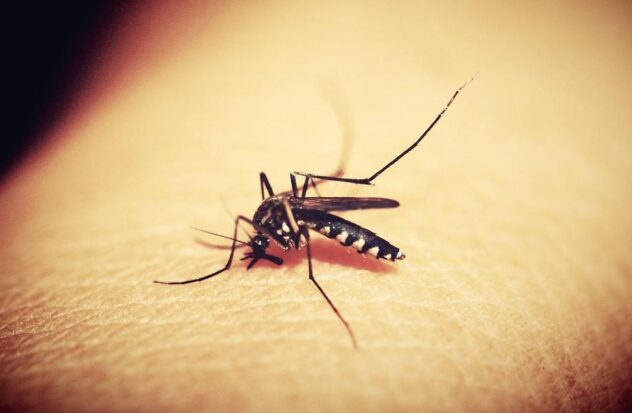MIAMI.- The subtropical climate of the state of Florida and its variety of habitats make it a paradise for mosquitoes said some university experts who not only work on the issue of the diseases they cause but also offer protection recommendations to avoid bites from these tiny animals.
Mosquito season runs from March to October in this region and mosquitoes are more active when temperatures range between 70 and 90 degrees, said scientists from the University of Florida (UF) who for several years have been analyzing the risk of pathologies caused by these insects.
Longer mosquito seasons may increase mosquito abundancewhich could lead to more bites and a higher incidence of disease.
As the Sunshine City enters peak mosquito season, experts at the University of Florida’s Emerging Pathogens Institute (EPI) outline the top mosquito species and disease risks. related events, transmission trends in the state, and the most effective ways to protect yourself.
“Every mosquito bite is a possibility of becoming infected,” said medical geographer Sadie Ryan, associate professor in the UF College of Liberal Arts and Sciences and EPI member. “It is important to be aware of local disease risks and take preventive measures to protect yourself.”
Four species of mosquitoes
The vast majority of mosquito species do not pose a threat to human health, said insect toxicologist Daniel Swale, associate director of Training and Special Projects at EPI and associate professor at the Institute of Agricultural and Food Sciences at the same center. study.
However, four species of Florida mosquitoes are important vectors of human diseases and are common in homes across the state. They are the yellow fever mosquito, known scientifically as Aedes aegypti; the Asian tiger mosquito, or Aedes albopictus; the southern house mosquito, or Culex quinquefasciatus; and the common malaria mosquito, or Anopheles quadrimaculatus.
Mosquitoes aren’t the only annoying biting insects in Floridasaid insect toxicologist Jeffrey Bloomquist, a professor at the UF Institute of Food and Agricultural Sciences and an EPI member. Biting mosquitoes, also known as “no-see-ums,” can also be a nuisance, especially in the morning and evening.
Mosquitoes are considered the deadliest animals on the planet because they transmit diseases such as dengue, malaria, chikungunya, yellow fever and Zika and they must be kept under control and their reproduction prevented, experts said. Florida tends to experience small annual outbreaks of dengue.
Because Florida is a global travel hub, Floridians and tourists alike can inadvertently transport pathogens into the state and introduce them to local mosquito populations. The Florida Department of Health actively monitors cases of mosquito-borne diseases, both those acquired abroad and locally.
The Florida Department of Health also tests mosquitoes in the area for key pathogens, as well as animals such as birds and horses for antibodies that indicate they have been recently infected with a mosquito-borne disease.
How can you protect yourself from mosquitoes?
A simple way to reduce mosquitoes is to limit their access to standing water, which is where they breed.
Although mosquitoes are abundant in swamps and wetland areas, they have also established themselves in the more developed areas of the state. The University of Florida cited a recent study that showed that the most urbanized parts of the Miami-Dade area are primarily occupied by Culex and Aedes mosquitoes, both important disease vectors.
You can reduce the number of mosquitoes by emptying excess water from containersdisposing of spare tires and making sure gutters are clean.
Throwing away containers, children’s toys, flower pots, wading pools, and other small areas in the yard that may hold water can really help control many mosquitoes around your residence. Additionally:
- Repellents such as DEET and picaridin can help increase personal protection. DEET is safe, effective and long-lasting, and remains the universal gold standard of insect repellents. DEET is simply the common name for N,N-diethyl-m-toluamide. It has been used as an effective insect repellent since it was developed by the United States Army in 1946.
- Repellents derived from natural ingredients such as citronella, lemongrass, and vanilla can also be effective for short periods of time.
- Clothing treated with synthetic chemicals known as pyrethroid chemicals can also ward off pesky biters.
- During peak mosquito bite times, wear long sleeves and tuck your pants into your socks.
Academic Jeffrey Bloomquist has developed a new natural repellent derived from pyrethrins, compounds from chrysanthemum flowers that have been used to control insects for centuries. More effective than DEET, the repellent provides solid protection against mosquitoes and ticks, he said. “It can come to market as soon as someone wants to license the patent and develop it,” she added.
According to models, Florida will stay warmer for longerwhich will increase the conditions for mosquitoes.
While these changes could put more pressure on health agencies and control efforts, Florida offers a model for how to reactively manage vector-borne diseases. There is experience accumulated by so many years of study, as shown by the University of Florida.
(email protected)
Source: UNIVERSITY OF FLORIDA


